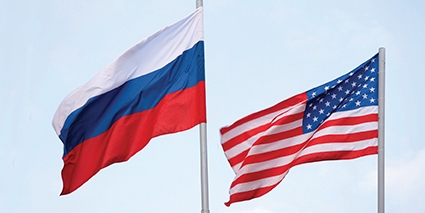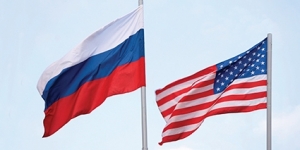Russia-US Relations May Reach a Point of No-Return
Op-ed
Relations between Russia and the US are at the their lowest since the end of the Cold War. Recent developments over the last several days have shown that there remains very little for Washington and Moscow to improve their relations with. Despite at times positive rhetoric from US President Donald Trump on the necessity to work with Moscow on security issues, the geopolitical differences between the countries seem to be widening rather than diminishing.
On July 30, while speaking in an interview with Russian state television channels, Russian President Vladimir Putin announced that out of a thousand US diplomats and “support staff" currently working in Russia, "755 must stop their activities." This came after the US passed a bill that would impose additional sanctions on Russia.
Simultaneously, the US Vice President Mike Pence is touring the Balkans and Eastern Europe. In Estonia, for example, he spoke about the possibility of deploying the US Patriot antimissile defense system there, assuring the Estonians and other US allies in the region that Washington has "made it clear that the policy of our administration is to stand firmly with our NATO allies and to stand firmly behind our Article 5 commitment that an attack on one is an attack on all."
Pence is currently visiting Georgia, where 800 Georgian and 1,600 US troops are taking part in the military exercises dubbed “Noble Partner 2017”. Troops from Britain, Germany, Turkey, Ukraine, Slovenia, and Armenia are taking part, making it the biggest such exercise held on Georgian soil.
It seems that there is very little room for US and Russia to improve their stalled relations. Divergences are, in fact, so wide across the spectrum of issues that it is very unlikely that we will see any progress in US-Russia relations. That is not to say that the countries do not cooperate at all. The cooperation on establishing a ceasefire in parts of Syria following the Trump-Putin meeting is ongoing, as is work to establish cooperation on matters of space, cyber security and even non-proliferation of weapons of mass destruction. But even then, it is not enough to alter the overall course of those damaged relations. In fact, even Putin, in an interview with VGTRK host Vladimir Solovyov, commenting on possibilities of changing the US policies towards Russia, said, “to all appearances, if it ever changes, it will not happen soon”.
Entering a blind alley of confrontation
There is a heavy burden in making progress in bilateral relations; a whole range of problems before both countries, ranging from Ukraine and Syria, US military build-up in eastern Europe to Russian movements in Georgia’s breakaway territories (even though this question is not often raised). These divergences make it highly unlikely that the parties will find even a partial solution to their conundrum in the near future.
I have written previously that for the US, helping Ukraine is a strategic imperative. Any failure to do so would amount to allowing the resurgent Russia to project its influence on its immediate neighborhood. Restoration of Russian influence over Ukrainian territory would increase Moscow’s power over the Black Sea and the South Caucasus, thus threatening Eastern European security. For Russia, on the other hand, at least having the neutrality of Ukraine is as important. Moscow’s nightmare is Ukraine in the Western Alliance with NATO troops present along Russia’s south-western frontier.
Both countries have different visions in the Black Sea region, where Russia continues to build up its naval capabilities and project its power through the Crimean Peninsula. The US, on the other hand, pursues a policy providing the Black Sea states with arms to support their defense potential, as allowing the Black Sea to fall entirely into the Russian orbit will create fundamental problems for the US’ policy of containment of Russia in the Eurasian heartland.
Emil Avdaliani












